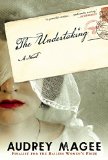Summary | Excerpt | Reading Guide | Reviews | Beyond the book | Read-Alikes | Genres & Themes | Author Bio

A Novel
by Helen DunmoreA riveting and emotionally absorbing portrait of post-war Soviet Russia, a world of violence and terror, where the severest acts of betrayal can come from the most trusted allies.
Internationally-acclaimed author Helen Dunmore follows her bestselling novel, The Siege, with a riveting and emotionally absorbing portrait of post-war Soviet Russia, a world of violence and terror, where the severest acts of betrayal can come from the most trusted allies.
In 1952 Leningrad, Andrei, a young doctor, and Anna, a nursery school teacher, are forging a life together in the postwar, post-siege wreckage. But they know their happiness is precarious, like that of millions of Russians who must avoid the claws of Stalin's merciless Ministry of State Security. When Andrei is forced to treat the seriously ill child of a senior secret police officer, his every move is scrutinized, and it becomes painfully clear that his own fate, and that of his family, is bound to the child's. Trapped in an impossible game of life and death, and pitted against a power-mad father's raging grief, Andrei and Anna must avoid the whispers and watchful eyes of those who will say or do anything to save themselves.
With The Betrayal, Dunmore returns with a powerful and stirring novel of ordinary people in the grip of a terrible and sinister regime, and an evocative tale of a love that will not be silenced.
Dunmore's brilliance lies in her ability to pare down the sweeping drama of Soviet Russia into small, clear descriptions of how average families are affected by societal forces. The reader is brought inside Anna and Andrei's relationship and made to feel the stresses, joys, fears that they feel... Dunmore's ability to integrate the reader so seamlessly into her narrative is masterful. This is a powerful novel, one that has stuck in my mind since I finished reading it. The Betrayal is perfect for book clubs and is sure to be a favorite with people who enjoy historical or literary fiction...continued
Full Review
(753 words)
This review is available to non-members for a limited time. For full access,
become a member today.
(Reviewed by Sarah Sacha Dollacker).
The Betrayal is loosely based on a series of investigations that took place toward the end of Joseph Stalin's rule in 1953, formally known as "The Doctors' Plot." This bizarre scheme wrongfully accused nine prominent Moscow doctors - the majority of whom were Jewish - of coordinating the deaths of high-ranking Soviet Party members. Rather than respecting these doctors' medical authority and accepting terminal diagnoses, the Party members turned on them and suspected them of plotting their assassinations.
According to a report disclosed by the CIA under the US Department of State Freedom of Information Act, the doctors were singled out, "as part of a ring of spies working for a 'Jewish-bourgeois nationalist group,' which in turn was ...
This "beyond the book" feature is available to non-members for a limited time. Join today for full access.

If you liked The Betrayal, try these:

by Audrey Magee
Published 2015
A much-anticipated debut from a remarkable new talent in Irish fiction—a terrifyingly intimate story of a war marriage caught up in the calamity of World War II

by Tom Rob Smith
Published 2010
Former state security officer Leo Demidov is struggling to change as the Soviet Union changes around him. The two young girls he adopted have yet to forgive him for his part in the death of their parents, and they are not alone; now that the truth is out, Leo and his family are in grave danger from someone consumed by the dark legacy of Leo's past...